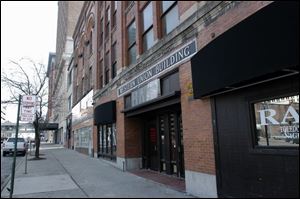
Western Union's fate a reminder that no corporation is invincible
3/22/2005Even the mighty can stumble and fall.
Enron Corp. and WorldCom Inc. got their comeuppance because of cooked books and other criminality. But now, bigger, older, more famous, and respected companies are vulnerable too.
AT&T Corp., which turned 120 years old this month, soon will become part of SBC Communications Inc. AT&T, once known fondly as "Ma Bell," never really recovered from its court-mandated breakup 21 years ago.
General Motors Corp., for many years the world's largest industrial corporation, gave up that title and is now fighting to remain the largest automaker, against stiff competition from Toyota Motor Corp. In addition, GM is struggling with massive debt, a projected $1 billion loss, and the possibility that its debt securities could be downgraded to "junk" status.

In its heyday, the company had 43,000 employees and touched the lives of nearly every American. An innovation of the 1950s was the Telecar, which contained a facsimile machine, to speed delivery of a telegram.
If anybody believes that any corporation can be too big, too old, or too famous to take a dive, he needs only look at what happened to Western Union Corp. That American icon went, in one generation, from a household name - a huge corporation that employed 43,000 and touched the lives of nearly every American - to a bankrupt company and finally to a business unit of another company.
Today, Western Union is no longer a communications giant, but rather survives on the money-transfer business.
And in recent years, it has come under federal scrutiny for some questionable money transfers that violated money-laundering rules (a case it settled for a $3 million civil penalty). It also was investigated in an anti-trust case, which was dropped last week by the Justice Department.
What happened to Western Union in its 154-year history certainly could happen to any younger or smaller company.
Western Union, for decades a leader in technology, finally fell victim to technological change, even though the firm tried gamely to keep up.
The company started in 1851 in Rochester, N.Y., as the New York and Mississippi Valley Printing Telegraph Co. and five years later became the Western Union Telegraph Co.
By the time of its centennial, in 1951, Americans were accustomed to sending telegrams of congratulations, telegrams to announce births and report deaths in the family, and, of course, to deliver important business information.
In 1951, the local Western Union office, on Jefferson Avenue, and its satellite offices employed 125, including 48 machine operators and 35 messengers. Even as recently as 1983, the firm spent $2.5 million to move a control center into the eighth floor of the 425 Building at Jefferson Avenue and Superior Street, the former Secor Hotel.
For many years, companies relied on Western Union for speedy delivery of information. Until the early 1970s, for example, Blade reporters on out-of-town assignments routinely sent their stories via telegrams from Western Union offices that were open 24 hours a day.
Facing changing technology, Western Union tried some things that now appear silly: singing telegrams, CandyGrams, CigarGrams, and Dolly-grams. But it also introduced some eminently sensible innovations: Radio telegrams, facsimile transmission, "mailgrams" delivered through the U.S. postal system, and its own communications satellites.
But it was a losing fight. Western Union lost its monopoly status in 1981. It suffered from nationwide strikes in the 1970s and 1980s. By 1984, it was skipping its dividends, and by 1987 it defaulted on hundreds of millions of dollars in loans. And in 1988, it reported a loss of $652 million.
It changed its name to New Valley Corp. and filed for bankruptcy in 1992. During the reorganization, Western Union's assets were sold, and its money-transfer business ended up by 1995 in the hands of First Data Corp., of Greenwood Village, Colo., which had spun off from American Express Co.
In a centennial news release in 1951, Western Union boasted that its engineering was "already a jump ahead of the next century." But, of course, by the time the next century arrived, Western Union was history, at least as an independent company.